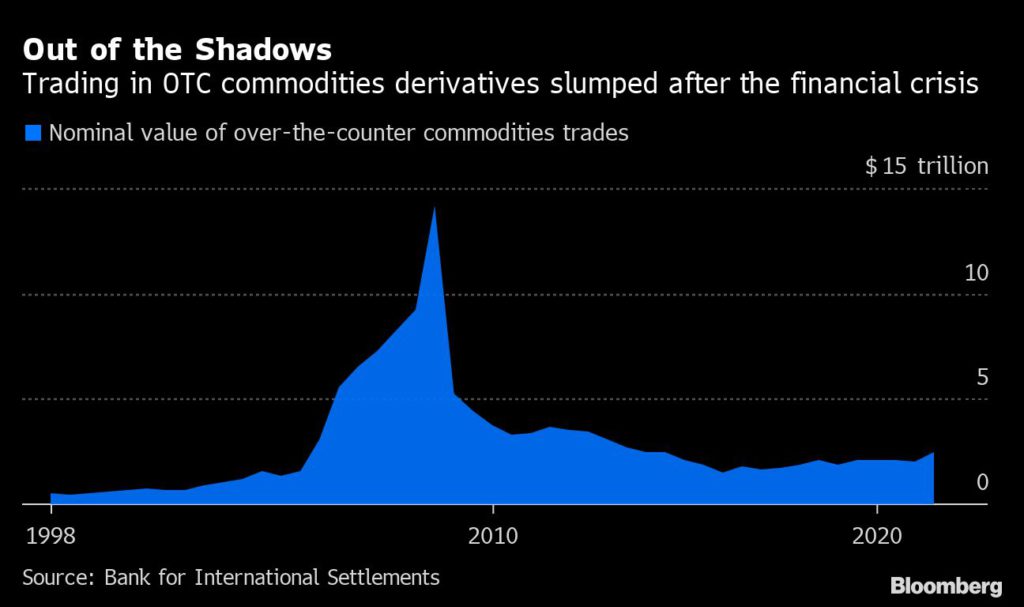The LME boss has a plan to catch the next big short

The London Metal Exchange’s demand for details of private deals between its members and their clients marks a line in the sand by chief Matthew Chamberlain, as he seeks to repair the market’s reputation and avoid a repeat of this year’s nickel-market chaos.
Yet it’s likely to reverberate far beyond the metals world. The LME’s proposal represents the first major move to increase oversight of global commodity markets as wild price swings following Russia’s invasion of Ukraine leave regulators increasingly uneasy. There’s a growing worry about the risks hidden in opaque corners of the trade in natural resources — and the vast ecosystem of privately negotiated over-the-counter derivatives deals is a prime example.
In the nickel crisis in early March, most of the massive short bet at the center of the squeeze was held in OTC deals with banks, so the LME didn’t grasp the scale and potentially systemic nature of the position. Prices spiked 250% over two days, bringing a handful of dealers to the brink of failure before the LME suspended the market and controversially canceled billions of dollars of trades.
While Bloomberg reported last week that the “ big short” has been reduced by more than half, Friday’s proposal that members submit weekly reports on OTC positions is the latest evidence that the crisis will leave an indelible mark on the London metals market. The changes would dramatically expand the LME’s surveillance abilities, going beyond its regulatory obligations and setting it apart from other commodity exchanges.
The experience in nickel shows that reform is needed now, Chamberlain says, and he’s committed to seeing it through.
“Look at what happens if we don’t have these powers,” he said. “It is one of the best and most immediate things we can do to have better advance notice of situations like this.”
Chamberlain, a former banker who became CEO in 2017, announced plans earlier this year to leave for a new job in the crypto industry but has agreed to stay and steer the LME through the fallout of the nickel squeeze. The crisis has cast the exchange into the global spotlight, eliciting investigations from UK regulators as well as concern and criticism from institutions including the International Monetary Fund and the US Federal Reserve.
It’s also drawn harsh judgment from traders and investors, raising questions about the future of the LME’s historic role at the center of the global trade in industrial metals. Metals dealers say they expect that a long era of light-touch oversight of the exchange by regulators is probably drawing to a close, although it’s not clear what form that might take.
In his first public interview since agreeing to stay on, Chamberlain acknowledged the damage wrought by the crisis.
“We know that all of our partners and users and clients will think about whether they want to continue doing business with us,” he said. “I hope that the steps that we’re taking, the roadmap we’ve laid out, offers some comfort.”
The LME has allowed two weeks to discuss the proposed changes with its dealers, some of whom have strongly — and successfully — opposed similar moves in the past. In the OTC market, miners, commodity trading houses and manufacturers like carmakers can hedge pricing risk on the metals they buy and sell, while financial investors like hedge funds take bets on prices. The banks can offer more complex and tailor-made products than are available on the LME and the bilateral nature means the deals don’t go through the exchange’s clearinghouse and margin requirements.
The first step of the overhaul would compel banks to report positions privately to the LME, and the bourse may in future publish aggregated reports about OTC activity. U.S. and European regulators already receive some information about OTC commodities transactions, but the LME’s new rules could bring substantially more transparency. More crucially, it would allow the bourse to act when it spots signs of a looming crisis.
“You can inundate the world with data, but if no-one reads and checks the stuff, then it doesn’t serve much of a purpose,” said Steven Kelly, a research associate at the Yale Program on Financial Stability. “You could read the tape on mortgage-backed securities back in 2008, but that doesn’t mean anyone was checking it.”
OTC trading came under scrutiny from regulators in the wake of the global financial crisis. However, a sizable volume of bilateral commodities trading has continued. Public disclosure on the trades is by nature limited, though the snapshot glimpse provided in data from the Bank for International Settlements points to an upturn in activity last year.
There’s also an expectation that the sharp price moves across commodities will drive a further increase in OTC activity, as traders and industrial hedgers seek ways to avoid paying huge margin calls against on-exchange positions.
Chamberlain said he’s ready to defend the reforms against criticism that the exchange is overreaching and believes that the changes reflect the “direction of travel” that the market wants to see.
“Even if there isn’t a wholesale change in the way that these things are regulated, I think we have to accept that it is our responsibility to take these broad themes and expectations of the community in which we operate, and push them forward.”
Close interest
The Financial Conduct Authority and the Bank of England have announced investigations into the nickel crisis and the FCA has said it will take a “close interest” in how the LME manages and responds to the issues.
At the FCA, a push to develop more sophisticated, data-heavy monitoring of UK markets is already underway and the London commodities markets could prove a handy arena to test enhanced market-monitoring systems.
“The regulators will clearly be taking this very seriously,” said Hannah Meakin, a partner at Norton Rose Fulbright. “Regulation of trading venues is a continual evolution so there are already some changes taking place, but what’s happening with the LME may adjust some of the focus and make particular aspects more relevant.”
The increased attention on the LME also takes place against the backdrop of London’s new status outside of the European Union.
A clampdown on one of its oldest financial institutions would run counter to pledges to unshackle the City from some of its regulatory constraints. Yet the U.K. needs to demonstrate in the wake of Brexit that its financial markets are regulated to the same standard as those in Europe to maintain equivalence status.

Transaction reporting in OTC markets is one key area of potential divergence between UK and EU regulatory regimes, according to Simon Appleton, a director at Kaizen Reporting, which assists financial firms with their regulatory reporting obligations. While the FCA is looking to return more power to trading venues, volatility in commodity markets could mean that surveillance is stepped up, he said.
Speaking privately, dealers note that much of the OTC market is already mirrored on the LME because dealers hedge their own risk from the bilateral deals on the exchange. However, a select number of banks have large internal OTC trading platforms where clients’ positions are often netted off against each other, rather than being hedged on the LME.
Chamberlain said in March that banks had lobbied against previous efforts to increase transparency and bore some responsibility for the conditions that led to the nickel squeeze.
Some of the exchange’s biggest dealers, meanwhile, are eager to avoid a mass migration into OTC markets that are dominated by the big banks.
“Post-financial crisis, regulators wanted to mandate fewer bilateral agreements, and if this is a continuation of that trend, it makes sense,” said Simon Van Den Born, president and head of metals at commodities brokerage Marex. “The days of selling leverage as a competitive tool are over — we saw that in commodities markets in March, and we’ve seen it in financial markets of late. Being the cheapest, being the least expensive and being the least transparent cannot be the way forward.”
(By Mark Burton, with assistance from Jack Farchy)
{{ commodity.name }}
{{ post.title }}
{{ post.date }}




Comments